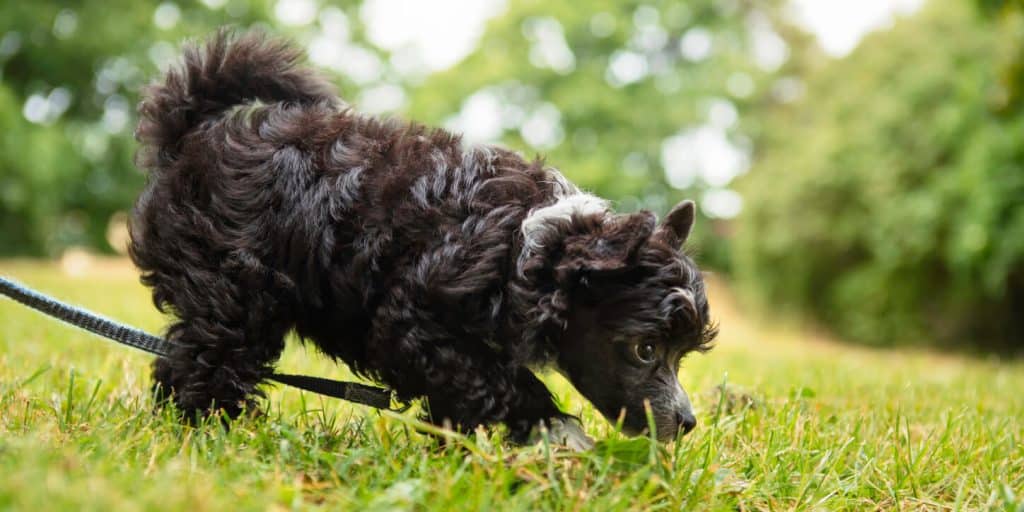From the grass and trees to other dogs’ butts, our dogs just can’t get enough of all the scents around them. But there’s a reason why dogs love to smell everything.
In fact, our pups have up to 300 million smell receptors (compared to our mere 6 million) to navigate the world, says Joanne Fernandez, the director of Veterinary Affairs at ABCs Puppy Zs.
Not all scents are created equal, though. Qiai Chong, a certified separation anxiety trainer (CSAT), animal behaviourist, and co-founder of Pet Coach, says dogs are naturally curious about these scents (especially on walks!):
- Humans
- Other animals
- Food or treats
- Scent markings
- Strong-smelling objects
It’s no surprise, then, that sniffing anything — and everything — is the favourite pastime for many pups. Dogs sniff everything to learn about their surroundings, find food, and even understand other animals.
Let’s explore why dogs love to sniff so much and how you can encourage happy and healthy smelling behaviours!
1. They’re Gathering Information
When dogs go for a walk, they can learn a lot just by sniffing. For example, Dr. Fernandez says they can tell if another animal passed by five minutes ago or even hours ago — it’s like reading a “timestamp”!
Dogs can even sense emotions through scent. She says they can tell if another dog was happy, scared, or feeling threatened when they left their scent behind.
Even more amazingly, our pups can potentially sniff out health problems. “Some dogs can smell the presence of certain cancers or infections in other animals before visible symptoms appear,” she explains. And believe it or not, they can even tell when humans are ovulating, which is why they sometimes sniff people’s crotches more during certain times of the month.
2. They’re Keeping Their Brains Busy
Sniffing is a big workout for a dog’s brain! Dr. Fernandez says a 15-minute sniffing session can give as much mental exercise as a whole hour of running around.
Letting your dog sniff on walks isn’t just fun for them; it helps keep their brain healthy, too. She explains that this type of mental challenge is great for working dogs like police K9s, who often feel calmer after doing scent training.
3. They’re Improving Their Mood
Sniffing can actually make dogs happier! Dr. Fernandez explains that it releases dopamine, a “feel-good” chemical. “Anxious dogs often show immediate stress relief when allowed to sniff freely,” she adds.
You might even see their shoulders relax and their tails wag! Watch your dog’s body language while they sniff, and you’ll see their confidence shine through. Sniffing even changes how they react to training.
4. They’re Communicating
Even if you don’t see other dogs on your walk, your dog can pick up lots of “messages” left behind. For example, Dr. Fernandez says one fire hydrant acts as a bulletin board of scents. She adds that these scents are so specific that dogs can even recognise scents from friends they haven’t seen in years.
Other scents dogs can sniff out on walks include signals from mother dogs to their puppies and mating interactions. Lastly, scent marking is also a way for dogs to show their social rank — some dogs will always mark over spots where other dogs have peed.

iStock/Marcus Lindstrom
5. They’re Finding Their Way Home
Dogs are great at using scents to make maps in their heads. That’s why there are stories of dogs finding their way home after being lost for years.
Dr. Fernandez says sled dogs can navigate snowstorms, and some dogs can find their way back from miles away just by using their sense of smell.
This ability also means some dogs perk up blocks before they reach their favourite park, or settle much more quickly into a new home when they have their own bedding, which signals they’re in a safe space.
6. They’re Detecting Fear or Anxiety
Many pet parents say their dogs can pick up that they’re stressed before they’ve even realised it themselves. That’s down to their superior sense of smell. “The ability to read human emotional states through scent explains why therapy dogs often approach people who are silently struggling,” Dr. Fernandez adds.
This ability to detect fear or anxiety is one explanation for why dogs sometimes react to something we can’t see or sense.
7. They’re Learning About Their World
Dogs use their noses like we use our eyes. “Dogs create a complete picture of an item through smell,” she explains.
With this ability, dogs can quickly detect when a single new object appears on their regular walking route — and of course, they want to stop and sniff it!
Should You Stop Your Dog from Smelling Everything?
While it might turn a short walk around the block into more of an extended sniff session, most of the time, your dog smelling everything isn’t a problem. “It’s a natural and essential behaviour that shouldn’t be stopped,” Chong says. But occasionally, it can become an issue.
If you’re concerned that your dog’s sniffing has become excessive, it’s best to speak to your veterinarian or a qualified behaviourist.
How to Encourage Healthy Sniffing for Your Dog
Ready to make the most of your dog’s superpowers? Chong suggests guiding your dog’s sniffing in a balanced way. Here are some activities she recommends:
- Snuffle mats
- Puzzle toys
- Treat-dispensing toys
- Nosework classes
As Dr. Fernandez says, every sniff tells a story. “By understanding and supporting your dog’s need to explore through scent, you’re helping them live a fuller, more enriched life,” she adds. And what could be better than that?



